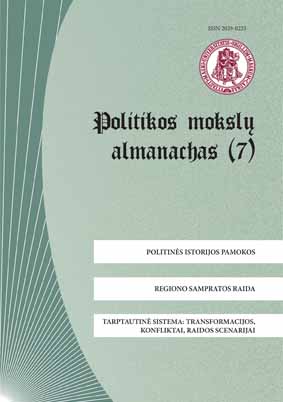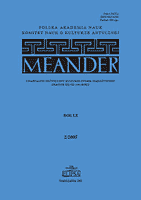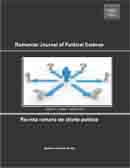


Keywords: Witold Gombrowicz; Ferdydurke; translatology
One of the most famous passages written by Gombrowicz is his parody of a Latin lesson in Ferdydurke. The present article examines the writer’s knowledge of the ancient world and languages and his attitude towards them. It also shows how his parody of schoolboys’ translations of Caesar was reproduced in various languages by Gombrowicz’s translators.
More...
Keywords: Latin; Indoeuropean; linguistics; etymology
The article relates various etymologies of the name Egeria that have been proposed by scholars. The most probable of them is the one proposed by Aldo Prosdocimi, who connects it with the Indoeuropean root meaning ‘lake’. The hypothesis has given rise to some difficulties at are here dealt with.
More...

Keywords: Greek literature; Archilochus; Sappho; papyri
The author presents the new fragments of Sappho (P. Koeln 21351 + 21376) and Archilochus (P. Oxy. LXIX 4708), gives a short review of the research to date, makes some textual and intepretative suggestions of his own, and adds an apparatus criticus to the text of Sappho proposed by Gronewald and Daniel. At the end of the first fragment of Sappho (line 8), he reads qala/mois a)ei/dw ('nuptias cano'), which, as a periphrastic generic term, together with a possible mention of the poems for the girls in the lost part of the same line, would cover the whole field of Sappho's poetry. In line 18 of the Cologne papyrus (i.e., line 10 of the second poem), he reads the fifth letter as phi (following West), but then puts forward an entirely new reading of the rest of the disputable phrase, suggesting e)/rwi fi/la qei=san ('amori indulgentem'); if the fifth letter is delta (the reading the Cologne papyrologists strongly insist upon), he alternatively proposes de/ma qei=san. As to the new Archilochus, in the author's opinion it is unlikely that lines 21-25 (in which Hercules' name appears) allude to Telephus' flight from the enemy, since the function of the whole exemplum is exclusively to extol the success of that hero.
More...
Keywords: classics; classical philology; conference; report
A report on the conference organized in Warsaw in May 2006 by graduate and undergraduate students of Classical Philology. The conference concentrated on the classicists’ contacts with other disciplines and on their use of modern research methods.
More...
Keywords: Latin literature; Horace; Polish translation
Horace's Ode to Chloe is published here in Krzysztof Rzepkowski's translation.
More...
Keywords: Latin; classical culture; nineteenth century
Henryk Struve’s article published in the weekly “Kłosy” is devoted to the disdain and ignorance of the Latin language and classical culture shown by the author’s contemporaries. This article is reprinted here with some remarks on the ignorance of Latin in our time.
More...
Keywords: classics; theatre; competition; report
A review of the Fourth Competition of Classics Student Theatres, held in Gdynia in October 2005.
More...
Keywords: philosophy; Georg Wilhelm Friedrich Hegel; sophists
Hegel was the first modern thinker that appreciated the sophists’ role in the intellectual history of mankind. Without consideration of their teachings as philosophy, he nevertheless emphasized the cultural role of their tendency to consider things from various points of view and to look for the sources of law and morality.
More...
Keywords: Greek literature; Plutarch; Polish translation
A part of Plutarch's work Virtues of Women in Natalia Cichocka's translation, with the translator's introduction and notes.
More...
Keywords: Greek literature; Diogenes Laertius; Pythagoras; epigram; Polish translation
Diogenes Laertius' four epigrams on Pythagoras are printed here in Maria Marcinkowska-Rosół's and Rafał Rosół's tranlation, with the translators' notes.
More...
Keywords: Latin literature; Horace; odes; translation
After quoting some Polish translations of Hor. Carm. I 11, the author analyses the ode, paying special attention to aspects that are usually lost in translation.
More...


Keywords: Margaret Atwood; Homer; review
A critical essay on Margaret Atwood’s The Penelopiad. An attempt made by Atwood to reread the myth of Penelope might be easily disregarded as a trivial postmodernist pastiche bearing too much resemblance to school assignments. Yet it is argued here that the novel deserves more serious consideration as belonging to the genre of “historicizing writings” instead of being a mere literary game, since its true value lies in Atwood’s ability to evoke the problems of the present by referring to the past.
More...
Keywords: Latin; pharmacy; review
A review of a Latin textbook for Polish pharmacy students.
More...
Keywords: Europeanization; competition policy; fuzzy sets
This article looks at the post-accession difficulties of new member states to fulfill the demands of EU membership and considers the degree of Europeanization in the area of competition policy. The article takes a comparative approach and looks at seven of the new Central and Eastern European member states. It analyzes the capacity of their national implementing actors to apply and enforce the EU legislation in area of competition policy. This article builds on theories of Europeanization and conditionality, and rational institutionalism to explain the problems of domestic adaptation to EU requirements in the context of the Eastern enlargement. By applying Fuzzy Sets Qualitative Comparative Analysis, the article examines the domestic causal factors conditioning the implementation process and how they interact in affecting it. The findings show that implementation is country specific and consequently no general path that generates efficient implementation can be derived, but only partial explanations based on various combinations of domestic factors. These observations are also relevant in the current ‘EU in crisis’ context. Specifically, they offer an indication of the areas vulnerable to the temporary deregulation of competition due to the Commission’s flexible approach to implementation in support of governments’ efforts to handle the crisis.
More...
Keywords: European Union; foreign policy; critical theory; narrative; realist; interpretive
The study of EU foreign policy has devoted over the last years great emphasis to the conceptualization of the role of the Union as an international actor. This paper critically analyzes two overarching narratives – realist and interpretive - about the role of the Union as an international actor employing insights from critical theory. By such narratives, it is meant those perspectives that have been developed in scholarship and have sought to answer questions about how the EU behaves in the international system and how it should behave. The method of critical reading implies uncovering the premises on which the international role of the EU was constructed within the two narratives, then underscoring their consequences and juxtaposing them to their founding principles. This endeavour highlights the purpose behind the different types of foreign policy constructed and promoted by the two narratives. Simultaneously, the study enquires into the shared commitment between the two narratives for the creation of a common foreign and security policy for the EU.
More...
Keywords: party democracy; factionalism; ethnic party; political elites; UDMR
Despite the fact that party dissolutions and degenerative forms of factionalism, no major splits or internal divides shaded the image of the main ethnic based party: the Democratic Alliance of Hungarians in Romania (DAHR). Similarly to other post communist countries, the minority representation in Romania constitutes an electoral success story. In a general framework of fragmentation and organisational instability, the DAHR’s political performance and continuity were doubled by an exceptional organisational strength. Although the ethnic based parties do tend to manifest higher levels of external cohesion as a result of their single-issue nature, their organisational continuity constitutes rather a cas a part which deserves further investigation. Consequently, the following article focuses on highlighting the mechanisms conducive to the accommodation of different factions considering that the anatomy of such internal arrangements constitutes an important resource for the understanding of party organisational survival. The analysis will show that even if DAHR seems to describe a mixture of party types, with important elements of party centralisation and party discontent among elites and delegates, the internal party regulations, notably the party primary system, balanced the power struggles within the organisation, resulting thus in a general model of auto proclaimed party democracy.
More...